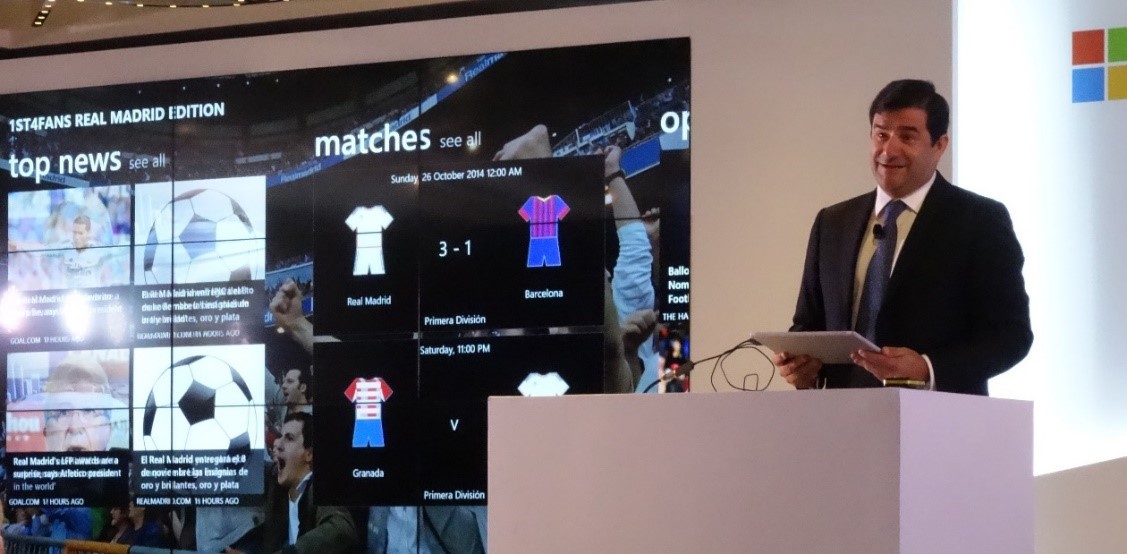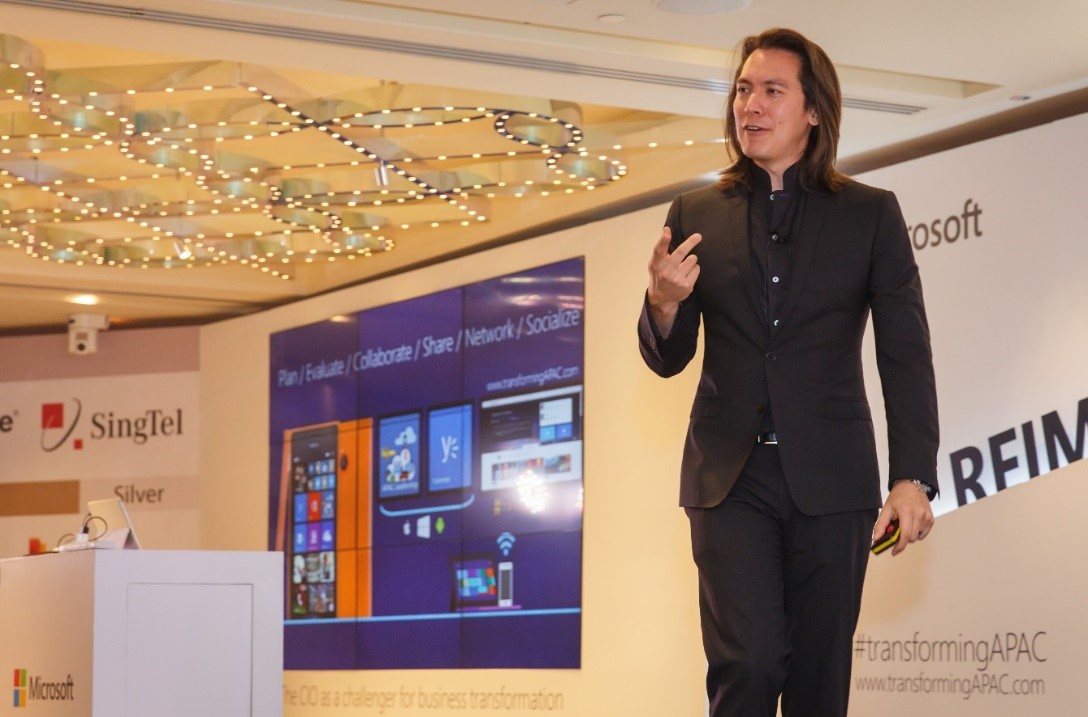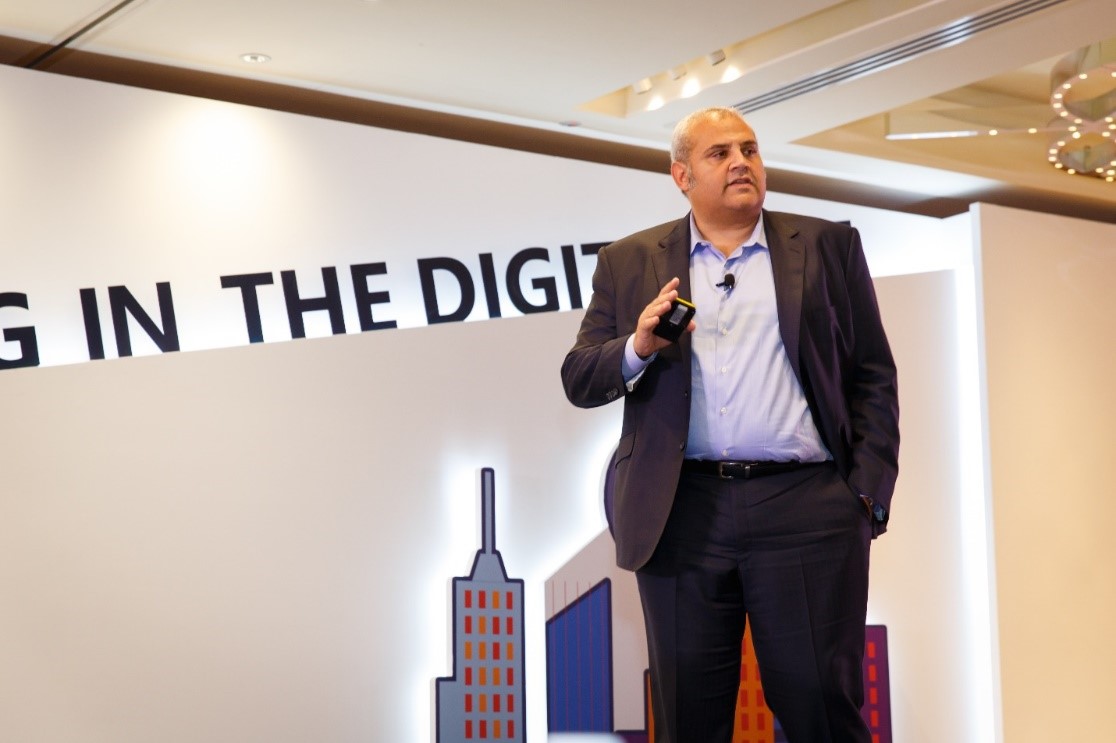200 customers. 40 sessions. 49 presenters. 11 sponsors. 10 countries.
Held between 27 and 30 October, the Microsoft APAC Executive Leadership Forum brought together CIOs, business leaders and leading technology players from the region to discuss challenges and opportunities IT leaders face today and the ‘Hows’ of driving digital transformation of their organizations.
The recent Microsoft APAC Executive Leadership Forum provided a platform for executives and IT leaders to exchange ideas on how technology can drive business transformation in the digital age.
During his keynote address, Alvaro Celis, Vice President, Microsoft APAC revealed that IT leaders in APAC are already leading the charge to harness new technologies and drive business transformation in a mobile-first, cloud-first world. He shared a Microsoft CIO survey of 291 leading IT decision makers in Asia Pacific which showed that IT leaders no longer see cloud technologies as new and disruptive. In fact 71% of IT leaders are prioritizing cloud in the next three years. In addition, Mobility, Internet of Things, Big Data and Social are seen as the top four most disruptive technologies for organizations in Asia today. This infographic provides a view of how IT leaders in Asia Pacific see disruptive technologies and their priorities for the next 3 years.

Cesar Cernuda: “Business Leadership, the Megatrends and People”

Cesar Cernuda, President, Microsoft Asia Pacific shared how Microsoft is reinventing itself, while continuing to excel in major parts of its business. Technology and people are integral in this transformation.
“Transformation has to start to at the top. Your CEO has to take the lead and over communicate internally and externally to ensure everybody understands the journey we are going through,” said Cernuda. “Think about all these megatrends (mobility, big data, cloud and social), what is really changing why it is important for us to change our behavior to realize its full potential,” he added.
Mike Walsh: Why Culture is an IT Problem

According to futurist and author of best-seller “Futuretainment”, Mike Walsh’s session on Unleashing the 21st Century Business, talked about the breakdown in network capital and dilution of culture which companies experience as they expand, and how technology plays an integral role in maintaining a company’s identity. . “Today, 70% of US employees are not engaged at work and only 41% know what their company stands for. The breakdown of culture is an IT problem. A company’s culture is tightly intertwined with its capability to succeed and technology is key to enabling a strong work culture,” shared Walsh.
Neal Suggs: A Trusted and Secure Cloud for Businesses
79% of IT leaders who responded to the Microsoft CIO Survey said that “Trust” or security, privacy, compliance and transparency of cloud-related solutions continue to be a concern. Addressing the issue head on, Neal Suggs, Associate General Counsel for Microsoft’s Business, Consumer and Public Sector said: “We are fighting governments across the world who look at us to produce data that only customers should provide.”

“Compliance is a journey, not a destination.” Suggs quoted European Commissioner, Viviane Reding, to emphasize that compliance should be seen as an asset and not a cost. “Some companies and a few governments continue to see data protection as an obstacle rather than as a solution, privacy rights as a compliance costs rather than an asset.”
He reiterated Microsoft’s pledge to safeguard customer data and elaborated on assurances with commitment from the top:
- Microsoft strives to be principled and limited in what is disclosed to third parties and remains committed to transparency
- Microsoft engineers cloud solutions from the ground up with security and privacy in mind
- Microsoft engages actively with regulators across the world to fulfill the toughest data security requirements
To learn more about Microsoft’s efforts in protecting our customers’ data, click here.
Scott Guthrie: A cloud for every business, every geography, every industry in Asia Pacific
Scott Guthrie, Executive Vice President, Microsoft Cloud and Enterprise Group touched on the three key differentiators for the Microsoft Cloud for businesses during his keynote session:
- Microsoft Azure has the broadest cloud reach across the world and boasts a total of 19 regions open for business – this is twice of what Amazon Web Services has and 6 times what Google offers today.
- Microsoft is the only service provider which offers choice with public cloud, private cloud and hybrid cloud environments.
- Microsoft is the only cloud provider that has been classified as a leader in all four Gartner cloud service magic quadrants:
1) Cloud Infrastructure as a Service
2) x86 Server Virtualization Infrastructure
3) Enterprise Application Platform as a Service for Azure
4) Public Cloud Storage Services
Boosting Microsoft’s ability to meet high growth demands in the region, Guthrie emphasized Microsoft’s presence in Asia with datacenters launched in Australia, Japan, China and India. ”Microsoft also announced the expansion of its ExpressRoute offering in Australia via Equinix and a new alliance with Telstra that offers Australian customers and partners the option to create private connections between the Australia Azure Regions and infrastructure located on-premises or in a colocation environment.
In partnership with Singapore Telecommunications Limited (SingTel), Microsoft announced availability of the Cloud Operating System Network in the region to enable organizations to move their data and workload easily between public cloud, dedicated private cloud and SingTel’s virtual private cloud.
“We are now in a mobile-first, cloud-first world. It is an incredibly exciting time to be in the industry, it is also an incredibly scary time to be in the industry. The opportunity to transform how we do business has never been greater. Within Microsoft we are already working on great solutions to optimize businesses in the new world,” said Guthrie.
Whether you were there or missed the forum, it is clear that the digital transformation of organizations in Asia Pacific is well underway. Microsoft has dedicated resources to enable that journey. Find out more at www.transformingAPAC.com






